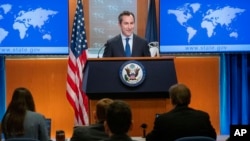The U.S. State Department has said it does not support Pakistan’s plan to build a pipeline to import gas from Iran.
State Department spokesperson Mathew Miller refused to comment on the nature of sanctions Pakistan could face for importing energy from Iran. However, he cautioned Islamabad against going ahead with the plan.
“But we always advise everyone that doing business with Iran runs the risk of touching upon and coming in contact with our sanctions, and would advise everyone to consider that very carefully,” said Miller, adding that “the assistant secretary made clear last week, we do not support this pipeline going forward.”
Donald Lu, Assistant Secretary of State for South and Central Asia told the House Foreign Affairs committee last Wednesday in a hearing that importing gas from Iran would expose Pakistan to U.S. sanctions.
Pakistan’s outgoing caretaker government approved the construction of an 80-kilometer section of the pipeline in February, largely to avoid paying Iran $18 billion in penalties for years of project delays.
Miller’s remarks came after Pakistani media reported Tuesday, Islamabad was planning to seek a U.S. sanctions waiver.
“We will seek exemption from U.S. sanctions. Pakistan cannot afford sanctions in the gas pipeline project,” Minister for Petroleum Musadik Malik told media during an informal chat, according to a report in Dawn News.
VOA reached out to Malik for details but did not receive a response.
Lu told the committee last week Washington had “not heard from the government of Pakistan a desire for any waiver for American sanctions that would certainly result from such a project.”
Pakistan’s Ministry of Foreign Affairs said Islamabad did not need a waiver to build the pipeline.
“It is a segment of the pipeline which is being built inside Pakistani territory. So, we do not believe that at this point there is room for any discussion or waiver from a third party,” Mumtaz Zahra Baloch, the Pakistani foreign ministry spokesperson said last Thursday in response to a VOA question at the weekly press briefing.
Pakistan and Iran signed an agreement in June 2009 for a pipeline to supply 750 million to 1 billion cubic feet per day of Iranian natural gas to Pakistan.
In the recently approved first phase, Pakistan will construct an 80km section of the pipeline from its border with Iran to its port city of Gwadar in the southwestern province of Balochistan.
Iran claimed completing construction of 900 kilometers of the pipeline on its side in 2011. However, Pakistan delayed construction on its side, primarily for fear of U.S. sanctions.
Tehran is under sanctions from Washington for its nuclear program.











